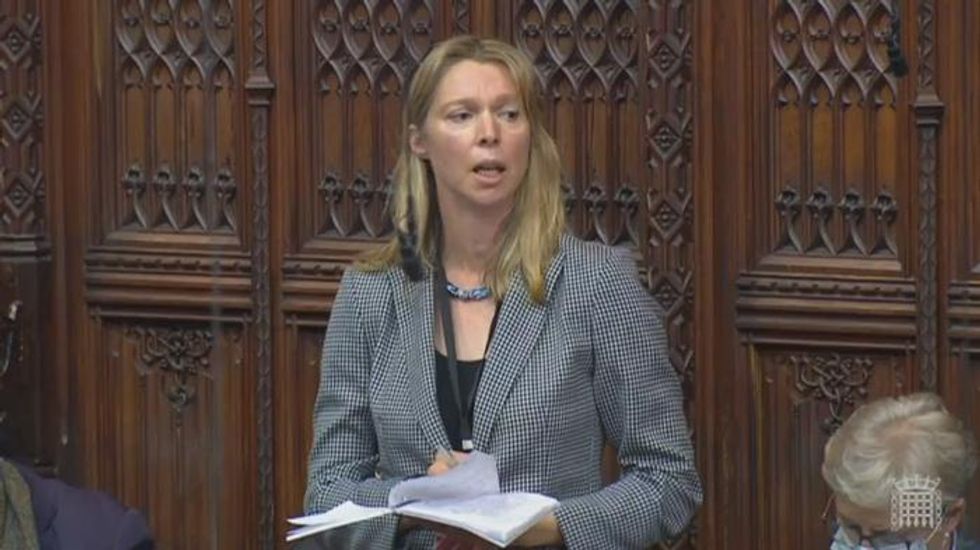Frank Field's statement was read out in the House of Lords as his illness meant he was unable to take part in the Assisted Dying Bill at second reading.
Don't Miss
Most Read
Trending on GB News
A former Labour MP “who is dying” and recently spent time in a hospice wants the laws on assisted dying to be relaxed.
A statement from Frank Field, 79, was read out in the House of Lords as his illness meant he was unable to take part in the Assisted Dying Bill at second reading.
The proposed legislation, tabled by independent peer Baroness Meacher, would give patients of sound mind, with six months or less left to live, the right to die by taking life-ending medication.
Campaigners say a change in the law would give those at the end of their lives greater control over how and when they die.
Opponents, including many religious leaders, say it could leave vulnerable people exposed to unwanted pressure.
Opening the debate, Lady Meacher said: “Our colleague Lord Field of Birkenhead, who is dying, asked me to read out a short statement.”
Baroness Meacher joins demonstrators, including Humanists UK's members and supporters, during a protest outside the Houses of Parliament in London to call for reform as peers debate the new assisted dying legislation.
Dominic Lipinski
Peers heard Lord Field said: “I’ve just spent a short period in a hospice and I’m not well enough to participate in today’s debate. If I had been, I’d have spoken strongly in favour of the second reading.
“I changed my mind on assisted dying when an MP friend dying of cancer wanted to die early before the full horror effects set in, but was denied this opportunity.
“A major argument against the Bill is unfounded. It is thought by some the culture would change and that people would be pressured into ending their lives.
“The number of assisted deaths in the US and Australia remains very low, under 1%, and a former supreme court judge of Victoria, Australia, about pressure from relatives, said it just hasn’t been an issue. I hope the House will today vote for the Assisted Dying Bill.”
Lord Field took his seat in the upper chamber in October 2020 after being elected 10 times to represent Birkenhead between 1979 and 2019.
Demonstrators, including Humanists UK's members and supporters, during a protest outside the Houses of Parliament in London to call for reform as peers debate the new assisted dying legislation.
Dominic Lipinski
He served as welfare reform minister in Tony Blair’s first government in 1997 and went on to chair the Work and Pensions Select Committee.
He later resigned the Labour whip over antisemitism and “nastiness” in the party under Jeremy Corbyn’s leadership.
Currently, those who are judged to have assisted the suicide or attempted suicide of another person can be jailed for up to 14 years.
Under the terms of the bill, the person wanting to end their life would have to sign a declaration approved by two doctors, which is signed off by the High Court.
Lady Meacher urged peers to “drag” assisted dying legislation in England and Wales “out of the 1960s and into the present day”.
She said the current law “turns compassionate friends and family into criminals”, adding it “causes thousands of dying people” to attempt to take their own lives alone in order to protect their relatives.
But the proposals split the House, with the Archbishop of Canterbury, the Most Rev Justin Welby, saying there is “unanimity” on the benches of the bishops that the law on assisted dying “does not need to be changed”.
He said the Bill is “unsafe”, adding: “All of us here are united in wanting compassion and dignity for those coming to the end of their lives.
“But it does not serve compassion if by granting the wishes of one closest to me, I expose others to danger and it does not serve dignity if in granting the wishes of one closest to me, I devalue the status and safety of others.
I hope your Lordships will reflect, and while recognising the good intentions we all share, resist the change this Bill seeks to make.”
Conservative Lord Farmer said: “This Bill facilitates death without reference to those most impacted by it. It is an atheist’s bill, denying God and denying eternity.”
But Conservative peer Baroness Cavendish of Little Venice, who spoke in favour, asked: “Why do we treat our pets with so much more care and compassion at the end than we do humans? And I think unless we can answer that debate, my lords, we should be very careful about doing nothing.
“To do nothing in this context is to consign more people to slow, agonising deaths, to force relatives to risk a jail sentence, if they help, and to leave some people going to Switzerland earlier than they wish to – if they’re lucky enough to have that option – or in other cases to starve themselves to death.”
Downing Street has said the Government continues to regard the issue of assisted dying as a matter of conscience for individual MPs and peers.
“This is obviously a very emotional issue,” a No 10 spokesman told reporters at a daily briefing for political journalists at Westminster.
“The Government’s position on assisted dying has not changed. This is a matter for individual conscience. Any change in the law is for Parliament to decide rather than Government policy.”











